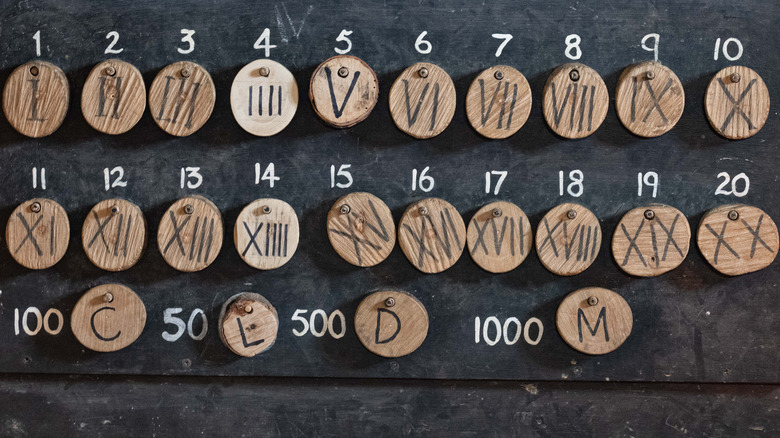Why 17, Not 13, Is Considered Unlucky In Italy
So we all remember "Friday the 13th," right? That 1980 horror film that spawned a franchise of hockey mask-wearing Jason Voorhees hacker-and-slasher films? That series all but permanently solidified in the modern mind an old superstition that dates back to an unknown origin and time: unlucky number 13. As CNN says, some suggest that the unlucky 13 myth goes back to Judas Iscariot in the Bible, the 13th discipline who betrayed Jesus to Roman authorities. Some suggest it goes back to Norse myth and the story of Loki tricking the god Hodr into shooting and killing his brother Balder, god of light. Yet others suggest it goes back even further to the Pleistocene era, when we find those rotund Venus of Willendorf-type statues associated with an ancient mother goddess of female fertility.
And yet despite the prevalence of unlucky 13 in certain countries, the number is not considered universally unlucky across the world. In Japan the number 4 ("shi") is considered unlucky because it's a homophone for the word for death (also "shi"), per Tofugu. And so, Japanese people often say "yon" for 4, instead. In India, as the Times of India explains, 13 is an astrologically auspicious number associated with creativity, peace, and prosperity. And in Italy, it's 17 that's unlucky, not 13. It's not exactly certain why, but as ThoughtCo describes, it might have to do with the Roman numeral for 17: XVII. If rearranged, XVII becomes VIXI, meaning "I have lived" in Latin, aka, "I am dead."
I have lived, I have died
Understanding the possible reason why 17 is unlucky in Italy requires a refresher on Roman numerals. We can assume that almost everyone understands how to read and write 1, 2, 3 in Roman numerals: I, II, III. Four is written like the five minus one, where V means five and I comes before it: IV. Six is 5 plus 1, which puts the I after V: VI. Roman numerals proceed in this fashion, where we combine different groups of numerals to create all possible numbers. Once we reach 10 things get easier, and key numerals less common. Ten is X, 50 is L, 100 is C, 500 is D, and 1,000 is M. So how would you write 1,462, for instance? MCDLXII. Written like an equation this roughly reads [1,000 + (500 - 100) + 50 + (10 +2)], aka 1,462.
But why, you ask, would VIXI mean "I have died" if VIXI is just a bunch of numerals? Well, we might use Arabic numerals, but we use Roman letters for our written language. VIXI isn't a number — it's the word "vixi" (pronounced "vi-chi"). Spanish speakers ought to recognize the cognate verb "vivir" in there, meaning "to live." As ThoughtCo overviews, Latin is a brain-bustingly complex language, especially its verbs. But as a discussion thread on Quora concludes, vixi is the "perfect active indicative form" of the verb "vivere." It's also singular. So, vixi means, "I (singular) have (perfect active) lived (past tense)."
[Featured image by Walters Art Museum via Wikimedia Commons | Cropped and scaled | CC BY-SA 3.0]
Un giorno nero: a black day
Even today, Italians tend to take their unlucky number 17 superstition pretty seriously. ThoughtCo says that the 17th of the month is "un giorno nero" — a black day. Folks might carry good luck charms around with them, like a red horn pendant or little hunchback figurine. Or, they might put a lucky horseshoe around the house. They also might not hold meetings on the 17th, get married, or really do anything of importance at all. Italian airlines might not have a seat number 17, and there's even a bobsled track in the area of Cesana that leaves turn number 17 unnamed; literally, the turn has been dubbed "senza nome" — "without name." Additionally, the Independent says that some Italian hotels don't have a room number 17. "It's true," the outlet quotes a nameless Italian writer, "we Italians don't consider 17 a good omen."
Whether or not a number in and of itself holds any true, magical power of ill fortune is up for debate. The power such beliefs have over the human mind, however, remains clear and obvious. The aforementioned Independent article dates back to 2007 and talks about an impending Italian soccer match against Scotland on November 17. Italy played 11 matches on the 17th of the month over the preceding 30 years, and only won four of them. That's not exactly what you'd call a smoking gun, but maybe in the minds of some players and fans it is.


